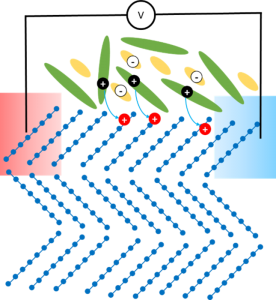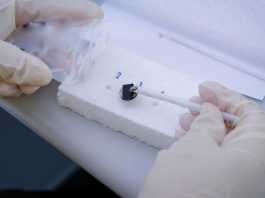Scientists attempt to convert body heat into electricity to take a step closer towards achieving high-performance organic thermolectrics.
Can you image charging your mobile phone by simply using your body heat? Thermoelectrics is all about transforming heat into useful energy, mostly utilising inorganic materials. The thermoelectric effect is the direct conversion of temperature differences to an electric voltage and vice versa through a thermocouple.
Due to the mechanical flexibility, lightweight, and low thermal conductivity of organic semiconductors, they have been widely adopted as a promising material system especially for flexible thermoelectric applications.
Effective doping for charge-carrier creation
Efficient doping for charge-carrier creation is key in thermoelectric device performance. Conventional bulk doping typically introduces disorder at high doping concentration, thus limiting the electrical conductivity.
“In our study, we employed the modulation-doping approach to highly ordered organic thin films, where the dopant impurity is separated from the conduction channel,” explained first author, Dr Shu-Jen Wang, from the Institute of Applied Physics at TU Dresden. “With this method, we are able to achieve highly efficient doping even at high doping densities without influencing the charge transport in the thin films.”

Analysing thermoelectric transport
The research team, working with Professor Karl Leo, investigated both the charge and thermoelectric transport in modulation-doped large-area rubrene thin-film crystals, with different crystal phases. They demonstrated that modulation doping allows for superior doping efficiencies, even for high doping densities, when conventional bulk doping runs into the reserve regime.
Modulation-doped orthorhombic rubrene achieves much improved thermoelectric power factors. “Our results show that modulation doping together with high-mobility crystalline organic semiconductor films is a novel strategy for achieving high-performance organic thermoelectrics,” noted Shu-Jen Wang.
“The main advantage of the modulation doping technique is the avoidance of ionised impurity scattering in the highly ordered undoped narrow bandgap semiconductor allowing both carrier concentration and mobility to be independently maximised.”
Achieving high-performance organic thermolectrics
Professor Karl Leo concluded, “Our work paves new ways to achieve flexible thermoelectric devices, which allow to directly generate electrical power from heat in an elegant and efficient way. We believe our work will stimulate further work on high performance organic thermoelectrics using the modulation doping approach with high mobility organic semiconductors.”









